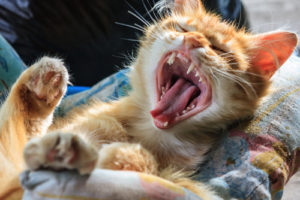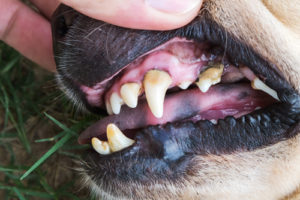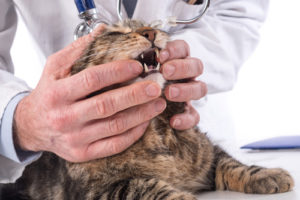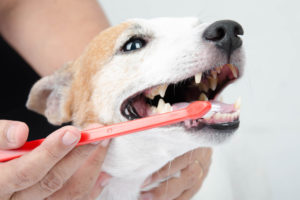Do I need to look after my pet’s teeth?
Yes! Your pet isn’t able to perform the simple oral care tasks that we as humans know are essential for dental health such as tooth brushing. They need to visit us regularly for dental health check-ups in the same way we should visit a dentist.
 Poor dental health can result in long term (chronic) pain for pets. Infections in the mouth can also cause infections elsewhere in the body as bacteria from the mouth can enter the bloodstream and travel elsewhere, and can be responsible for heart, kidney, liver and lung infections.
Poor dental health can result in long term (chronic) pain for pets. Infections in the mouth can also cause infections elsewhere in the body as bacteria from the mouth can enter the bloodstream and travel elsewhere, and can be responsible for heart, kidney, liver and lung infections.
Our pets are very good at hiding any pain they feel, and the way they show this – tiredness, aggression, slowing down – can often be mistaken for the normal aging process, so it’s really important that we keep an eye on what’s going on in their mouths to prevent not only pain, but also to stop any issues from occurring before they go on to cause permanent damage.
If you have your pet from a young age it really helps to get them used to having their mouths looked at right from the start. Once a week gently encourage them to let you in for a quick look, and reward them with lots of fuss for being obliging. Teeth brushing can be introduced then too.
What are the signs of a dental problem in my pet?
One of the most common signs – and is often a reason owners bring their pet in for a dental check up – is bad breath. If your pet is willing you should look inside their mouth to see if there are any visible signs of infection or decay, but it’s often easier if your vet and a trained helper do this for you!
 Another visible sign that your pet needs some help is tartar. This is a hard brown substance that can be seen where the teeth join the gum, and it then builds up from there. It’s caused by plaque on the teeth going hard (mineralising). Tartar causes gum inflammation (gingivitis) and a red and sore mouth that bleeds easily. This then leads on to dental disease, infection and a destruction of the tooth and tissues around it. The tooth will then become loose and possibly fall out or need to be removed surgically.
Another visible sign that your pet needs some help is tartar. This is a hard brown substance that can be seen where the teeth join the gum, and it then builds up from there. It’s caused by plaque on the teeth going hard (mineralising). Tartar causes gum inflammation (gingivitis) and a red and sore mouth that bleeds easily. This then leads on to dental disease, infection and a destruction of the tooth and tissues around it. The tooth will then become loose and possibly fall out or need to be removed surgically.
Signs that your pet might have disease at this stage might be eating in a different way – slowly, with their head on one side, eating on one side of the mouth only or refusing biscuits. They might also lose weight and generally show signs that they aren’t thriving. Cats can exhibit this through deterioration in the quality of their coat where they stop grooming themselves as efficiently to prevent mouth pain.
If you suspect any dental problems, you must see your vet to stop whatever deterioration is occurring as soon as possible. Situations only get more serious for the pet, and more complicated and expensive.
What happens when I bring my pet in for a dental examination?
The vet or nurse will talk to you about the general health of your pet as well as performing an oral examination. This is to assess signs of secondary problems caused by any dental issues picked up during the check up, and to ensure they are well enough for a general anaesthetic should any work need to be carried out.
 They will look for tartar and any gum redness, swelling and infection, and any obvious damage to or misalignment of teeth. They will also check for any gum recession or overgrowing, which are common secondary problems to gingivitis. Gum swelling is sometimes also due to a lump forming which is either benign (and more common in some particular breeds), or a more serious tumour.
They will look for tartar and any gum redness, swelling and infection, and any obvious damage to or misalignment of teeth. They will also check for any gum recession or overgrowing, which are common secondary problems to gingivitis. Gum swelling is sometimes also due to a lump forming which is either benign (and more common in some particular breeds), or a more serious tumour.
Cats have specific problems which will be checked for. Unfortunately it is very common for them to develop erosions of their teeth – called resorptive lesions – and these can be very painful and hard for an owner to detect. They are caused by the cat’s own immune system attacking the enamel of the teeth and causing holes in them.
Pets can develop cavities in their teeth in the same way we can, and these can cause infection and be really painful. Tooth fractures are also common. These are easy to spot if some tooth is missing, but if there’s a crack that extends to the nerve pulp then this is only visible by xray, and will be causing significant pain.
Less common problems include milk teeth not falling out, or falling out late resulting in adult teeth growing through in the wrong place, and misaligned jaws which whilst often purely cosmetic can cause problems if they result in teeth digging in to the palate.
What can I do at home to keep my pet’s teeth healthy?
 By far the most effective way to prevent dental problems is tooth brushing, as long as it’s started before any conditions occur. You will need to use a pet toothpaste as ours would be harmful to them, and they also prefer a meaty flavour! You can start using a soft cloth on your finger and work your way up to using a soft baby or pet toothbrush – either a standard one or one that you put on your finger. Our nurses are more than happy to demonstrate how to get started with brushing your pet’s teeth.
By far the most effective way to prevent dental problems is tooth brushing, as long as it’s started before any conditions occur. You will need to use a pet toothpaste as ours would be harmful to them, and they also prefer a meaty flavour! You can start using a soft cloth on your finger and work your way up to using a soft baby or pet toothbrush – either a standard one or one that you put on your finger. Our nurses are more than happy to demonstrate how to get started with brushing your pet’s teeth.
If your pet already has some inflammation or other dental problems then wait until treatment has been completed and their mouth is no longer sore before resuming or starting brushing.
One simple way you can help your pet is through their diet. In their natural state where they hunt and kill, their teeth are naturally cleaned by chewing on bones and hard body parts. For this reason cats who like the odd mouse or rabbit as a supplement to their diet sometimes have better teeth than those animals who chose not to hunt. That said, as this is no longer their natural way of eating our domesticated animals would struggle if you were to introduce bones to their diet. Cooked bones can splinter and cause serious problems in their mouths, throats and guts, and raw bones can result in stomach upsets and enamel chipping as well as splintering.
 There are some dental chews available for dogs that can be effective at plaque removal, although these don’t work if your dog has already developed tartar and dental disease. They can also be quite rich, so only give them occasionally and make sure they aren’t too big for your pet. You don’t want to replace dental concerns with diarrhoea!
There are some dental chews available for dogs that can be effective at plaque removal, although these don’t work if your dog has already developed tartar and dental disease. They can also be quite rich, so only give them occasionally and make sure they aren’t too big for your pet. You don’t want to replace dental concerns with diarrhoea!
For domestic animals, a biscuit diet is best as chewing on these can help safely replicate the benefits of gnawing on bones and tissue. Wet food also tends to stick to teeth which can cause plaque and subsequently tartar.
There are some pet foods specifically designed to encourage oral health, so do speak to us if you’d like to know more. It’s also always advisable to change your pet’s diet gradually.
This post is part of Dental Health Matters – our dental health awareness campaign at Village Vets.
We’re offering a FREE pet dental check-up to all pets over 3 years old
Book your free dental check-up
Recent Comments